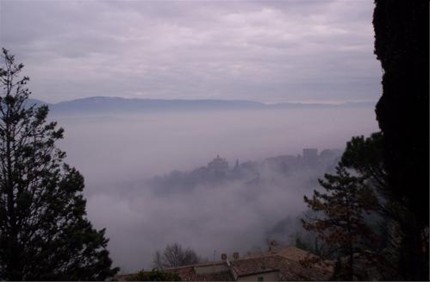Toscana segreta: fantasmi e leggende che popolano Secret Tuscany: the ghosts and legends haunting the region
 Di leggende su giovani nobili assassinate e guerrieri decapitati che ancora con i loro fantasmi infestano castelli e residenze storiche, la Toscana ne è piena. Si potrebbero organizzare veri e propri itinerari “stregati” alla scoperta di magioni e borghi antichi oggetto di fantasie e storie popolari, tanto improbabili quanto affascinanti e caratteristiche, simbolo di una Toscana ricca di memorie storiche rilevanti.
Di leggende su giovani nobili assassinate e guerrieri decapitati che ancora con i loro fantasmi infestano castelli e residenze storiche, la Toscana ne è piena. Si potrebbero organizzare veri e propri itinerari “stregati” alla scoperta di magioni e borghi antichi oggetto di fantasie e storie popolari, tanto improbabili quanto affascinanti e caratteristiche, simbolo di una Toscana ricca di memorie storiche rilevanti.
Se vi trovate a passare dallo splendido Castello di Sorci ad esempio, ad Anghiari in provincia di Arezzo, potrete visitare l’antica struttura del XII secolo, oggi divenuta una locanda e che fu di ispirazione anche per il famoso film toscano con Benigni e Troisi “Non ci resta che piangere”.
Il Castello è spesso visitato perché fu dimora di un noto capitano di ventura di cui narrò anche il letterato Niccolò Machiavelli, Baldaccio d’Anghiari. Baldaccio fu ucciso barbaramente a tradimento in Palazzo Vecchio e una volta decapitato, il corpo venne gettato in Piazza Signoria di fronte a una folla sconvolta: si dice che il suo spirito cerchi ancora vendetta nel Castello che fu sua dimora, e in molti dichiarano di avere sentito il rumore delle sue armature nel cuore della notte.
Sempre ad Arezzo e Cortona è nota la leggenda delle “Porte del Morto”: porticine alte e sottili terminanti a sesto acuto presenti in molte residenze antiche, che si dice servissero solo da uscita per i defunti. Secondo una lontana credenza, forse etrusca, la Morte usciva di casa col defunto e poteva rientravi solo dalla medesima entrata, ecco perché i morti venivano portati fuori solo da queste porte che poi venivano subito richiuse saldamente, per non permettere che rientrasse la Morte in casa.
E che dire dei tanti castelli in Lucchesia? Tutti accolgono un fantasma o uno spettro come fosse un silenzioso ed onorato guardiano. Basta ascoltare ognuno di questi castelli, ognuno dei tanti borghi toscani, per scoprire storie e leggende davvero indimenticabili. Tuscany certainly has its fair share of stories involving assassinated young noblemen and beheaded warriors who continue to inhabit the region’s Levitra Online castles and stately homes. Themed ghost tours could one day be organised around the manors and medieval villages providing the settings for these folk tales and urban legends. Unlikely as they may be, however, these captivating and unique fables represent the region’s colourful past.
Tuscany certainly has its fair share of stories involving assassinated young noblemen and beheaded warriors who continue to inhabit the region’s Levitra Online castles and stately homes. Themed ghost tours could one day be organised around the manors and medieval villages providing the settings for these folk tales and urban legends. Unlikely as they may be, however, these captivating and unique fables represent the region’s colourful past.
While in the province of Arezzo, for example, you might wish to stop off at the beautiful Sorci Castle in Anghiari. This ancient 12th century site is now an eatery and was the inspiration behind the famous Tuscan film Non Ci Resta Che Piangere (Nothing Left to Do But Cry), starring Roberto Benigni and Massimo Troisi.
The castle is a popular attraction because it was once the home of the well-known mercenary soldier leader, Baldaccio d’Anghiari. As documented by the writer Niccolò Machiavelli, Baldaccio was brutally and treacherously murdered in the Palazzo Vecchio, his beheaded body thrown from a window in front of a shocked crowd gathered in Piazza Signoria. Legend has it that his spirit continues to seek revenge in the castle that was once his home and, on many occasions since, witnesses claim to have heard the clanging of his armour in the night.
Arezzo is also home to the famous “Doors of the Dead”. A feature of many of the oldest buildings in Cortona, it is believed that these tall, narrow, pointed arch openings served the sole purpose of conveying coffins out of the house. According to a distant – possibly Etruscan – belief, Death would leave the house along with the deceased person and could only return through the same entrance. This explains perhaps why bodies could only exit through these doors and why the doorways would immediately be closed up tight again afterwards: to prevent Death from re-entering the house.
Finally, what about all those castles in Lucca? Here, the resident ghosts are revered as silent and honoured – almost mandatory – custodians. For some truly unforgettable stories and legends, just listen carefully when visiting these castles or touring one of the many Tuscan towns.
